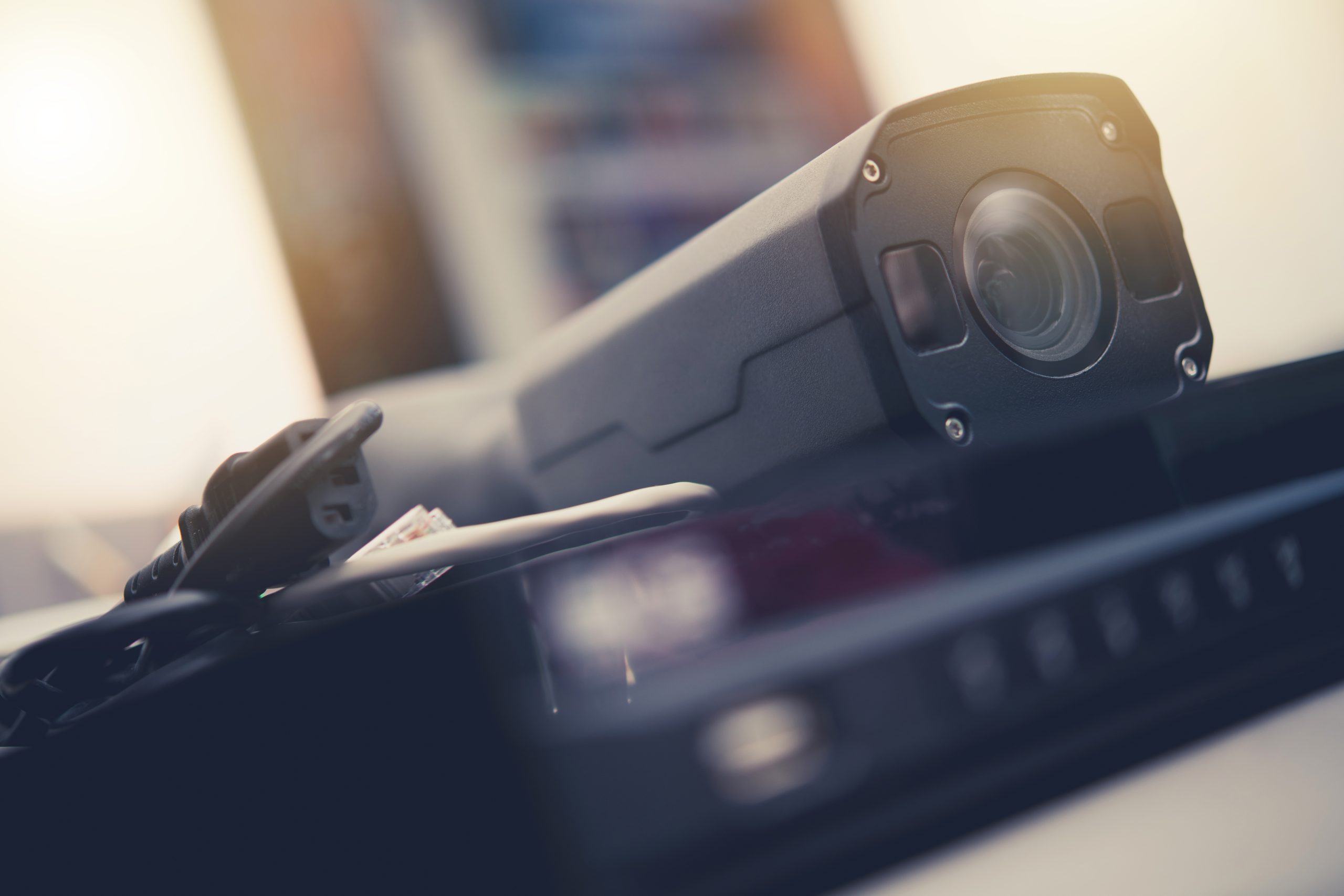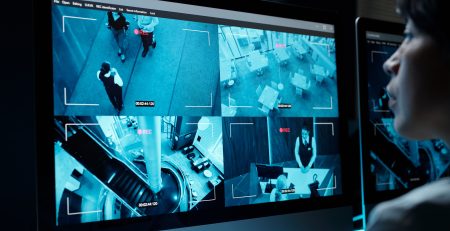Differences Between Analog Cameras and IP Cameras in CCTV
When it comes to choosing the right security camera system, many people ask themselves: “Should I go with analog or IP cameras?” Both options have their advantages and disadvantages, and the choice depends on a variety of factors, including the type of project, budget, and specific surveillance needs. In this article, we’ll explore the key differences between these two technologies to help you make the best decision for your CCTV system.
What is CCTV?
Closed Circuit Television (CCTV) is a monitoring system that uses security cameras to capture and record images in a specific environment. These images can be viewed in real time or stored for later analysis, providing an additional layer of security for homes, businesses and public spaces.
Brief History of Security Cameras
Security cameras have evolved significantly over the years. Initially, cameras were analog and used magnetic tape to record low-resolution images. As technology advanced, digital cameras emerged and, eventually, IP cameras, which brought significant improvements in terms of image quality and functionality.
Analog Cameras: How Do They Work?
Analog cameras capture images through a sensor and transmit them in the form of a video signal to a recording device, usually a DVR (Digital Video Recorder). This signal is sent through coaxial cables, and the recording is made in real time on local storage devices.
Advantages of Analog Cameras
- Lower cost: Analog cameras are generally more affordable, making them a viable option for projects with more limited budgets.
- Ease of installation: As they use older technology, their installation is relatively simple and can be done by professionals with basic experience.
- Compatibility: Most existing CCTV systems are analog, making it easy to replace or upgrade cameras without the need for major infrastructure changes.
Disadvantages of Analog Cameras
- Limited image quality: Analog cameras have a lower resolution compared to IP cameras, which can compromise image clarity in critical situations.
- Less flexibility: Analog cameras are less flexible in terms of connectivity and integration with other modern systems.
- Limited storage: Video storage is typically done on DVRs, which have limited capacity and may require hardware replacement or expansion over time.
IP Cameras: How Do They Work?
IP cameras capture digital images and transmit them over data networks, such as the Internet or a local area network (LAN). These images can be viewed on any network-connected device, such as computers, smartphones or tablets, offering greater flexibility and accessibility.
Advantages of IP Cameras
- High image quality: IP cameras offer superior resolutions, including HD and even 4K, ensuring sharp, detailed images.
- Advanced connectivity: They can be easily integrated with other systems, such as home automation, alarm and access control, as well as allowing remote monitoring.
- Cloud storage: IP cameras allow video storage in the cloud, eliminating the need for physical devices and offering greater security against data loss.
Disadvantages of IP Cameras
- Highest cost: IP cameras tend to be more expensive, both to purchase and maintain, due to their more advanced technology.
- Installation complexity: They require more in-depth technical knowledge for installation and configuration, as well as a robust network infrastructure.
- Network dependency: Monitoring quality may be affected by network issues such as low bandwidth or internet outages.
Direct Comparison: Analog Cameras vs. IP Cameras
To make the comparison easier, let's analyze some of the main aspects that differentiate analog cameras from IP cameras.
Image quality
While analog cameras offer a standard resolution that may be sufficient for basic monitoring, IP cameras provide high-definition images, which are essential for capturing important details such as license plates or faces.
Connectivity and Flexibility
IP cameras surpass analog cameras in terms of connectivity. They can be connected to the network, allowing remote access and integration with various security and automation systems, something that analog cameras cannot offer.
Data Storage
DVR storage limits the amount of video that can be archived in analog systems. In contrast, IP cameras offer cloud storage, which is scalable and accessible from anywhere as long as there is an internet connection.
Cost-Benefit
While the initial cost of IP cameras is higher, the return on investment can be greater in the long run thanks to the flexibility, superior image quality, and advanced functionality they offer.
Choosing the Best Option for Your Project
Choosing between analog and IP cameras depends on your specific needs. If budget is a primary concern and installation is straightforward, analog cameras may be sufficient. However, if image quality, flexibility, and remote monitoring are priorities, IP cameras are the better choice.
Advanced Technologies Present in IP Cameras
The latest IP cameras come equipped with a range of advanced technologies that take security to the next level, such as intelligent motion detection, enhanced night vision, and real-time video analytics. These features enable more accurate and proactive surveillance, identifying potential threats before they even occur.
Which Camera to Choose?
Ultimately, both analog and IP cameras have their place in the CCTV market. The right choice depends on your priorities in terms of cost, image quality, and connectivity needs. For those looking for the best in technology and flexibility, IP cameras are undoubtedly the ideal option.
If you are looking for top-notch security solutions, consider purchasing a CCTV system with IP cameras. C2H Solutions offers a range of services tailored to meet your specific needs. Contact us for a personalized quote via our contact page.
Common questions
- What is the main difference between analog and IP cameras?
The main difference is in image quality and connectivity flexibility. IP cameras offer better resolution and remote monitoring options.
- Are IP cameras more expensive than analog cameras?
Yes, IP cameras generally have a higher initial cost, but they offer better functionality and image quality.
- Can I mix analog and IP cameras in the same system?
Yes, it is possible to integrate both types into a hybrid system using specific devices such as hybrid DVRs or NVRs (Network Video Recorders) that support both types of cameras.
- What is the best option for long distance monitoring?
IP cameras are better for long-distance monitoring as they offer higher image quality and the possibility of digital zoom without losing much quality.
- Is it possible to monitor IP cameras remotely?
Yes, IP cameras allow remote monitoring through applications for smartphones, tablets or via internet browsers, as long as they are connected to the network.
These questions and answers cover the most common aspects and help clarify the main doubts about choosing between analog and IP cameras for CCTV systems.






Comments (12)
💡 A escolha entre câmeras analógicas e IP é crucial para garantir a segurança ideal do seu ambiente. Ambas têm suas vantagens, mas entender a tecnologia pode fazer toda a diferença!
👉 Quer aprofundar seus conhecimentos sobre #CFTV?
Explore mais conteúdos exclusivos em nosso blog na seção #CFTV.
🤝 Envie um email para nosso departamento comercial! comercial@c2hsolutions.com.br
💡 A escolha entre câmeras analógicas e IP pode impactar diretamente a segurança do seu espaço. Compreender suas diferenças é fundamental para garantir a proteção ideal!
👉 Quer aprofundar seus conhecimentos sobre #CFTV? Explore mais conteúdos exclusivos em nosso blog na seção #CFTV.
🤝 Envie um email para nosso departamento comercial! comercial@c2hsolutions.com.br
💡 As câmeras analógicas ainda têm seu valor, mas a tecnologia IP traz vantagens como maior resolução e fácil integração. Não subestime o poder da inovação na segurança!
👉 Quer aprofundar seus conhecimentos sobre #CFTV? Explore mais conteúdos exclusivos em nosso blog na seção #CFTV.
🤝 Entre em contato com nosso departamento comercial para soluções personalizadas! comercial@c2hsolutions.com.br
💡 As câmeras IP oferecem flexibilidade e acesso remoto, enquanto as analógicas são conhecidas pela sua simplicidade e custo reduzido. Cada uma tem suas vantagens, e escolher a certa pode transformar sua segurança! 🔍
👉 Quer aprofundar seus conhecimentos sobre #CFTV? Explore mais conteúdos exclusivos em nosso blog na seção #CFTV.
🤝 Envie um email para nosso departamento comercial! comercial@c2hsolutions.com.br
💡 A escolha entre câmeras analógicas e IP pode impactar significativamente a segurança do seu espaço. Entender suas diferenças é essencial para uma proteção eficaz!
👉 Quer aprofundar seus conhecimentos sobre #CFTV? Explore mais conteúdos exclusivos em nosso blog na seção #CFTV.
🤝 Envie um email para nosso departamento comercial! comercial@c2hsolutions.com.br
💡 A transição de câmeras analógicas para câmeras IP traz não apenas mais qualidade nas imagens, mas também uma gestão mais eficiente da segurança. A tecnologia está cada vez mais acessível e cheia de recursos!
👉 Quer aprofundar seus conhecimentos sobre #CFTV? Explore mais conteúdos exclusivos em nosso blog na seção #CFTV.
🤝 Envie um email para nosso departamento comercial! comercial@c2hsolutions.com.br
💡 As câmeras analógicas ainda têm seu espaço, mas as câmeras IP estão revolucionando a forma como monitoramos a segurança. A escolha certa pode fazer toda a diferença na eficácia do seu sistema CFTV!
👉 Quer aprofundar seus conhecimentos sobre #CFTV? Explore mais conteúdos exclusivos em nosso blog na seção #CFTV.
🤝 Envie um email para nosso departamento comercial! comercial@c2hsolutions.com.br
🔍 A escolha entre câmeras analógicas e IP pode impactar diretamente a segurança do seu espaço. Cada uma possui suas vantagens, e entender isso é essencial para uma boa instalação!
👉 Quer aprofundar seus conhecimentos sobre #CFTV? Explore mais conteúdos exclusivos em nosso blog na seção #CFTV.
🤝 Envie um email para nosso departamento comercial! comercial@c2hsolutions.com.br
#CFTVDiferenças Entre Câmeras Analógicas e Câmeras IP no CFTV#CFTVSegurança com Inovação e Confiabilidade – C2H Solutions
#CFTVDiferenças Entre Câmeras Analógicas e Câmeras IP no CFTV#CFTVSegurança com Inovação e Confiabilidade – C2H Solutions
#CFTVDiferenças Entre Câmeras Analógicas e Câmeras IP no CFTV#CFTVSegurança com Inovação e Confiabilidade – C2H Solutions
#CFTVDiferenças Entre Câmeras Analógicas e Câmeras IP no CFTV#CFTVSegurança com Inovação e Confiabilidade – C2H Solutions